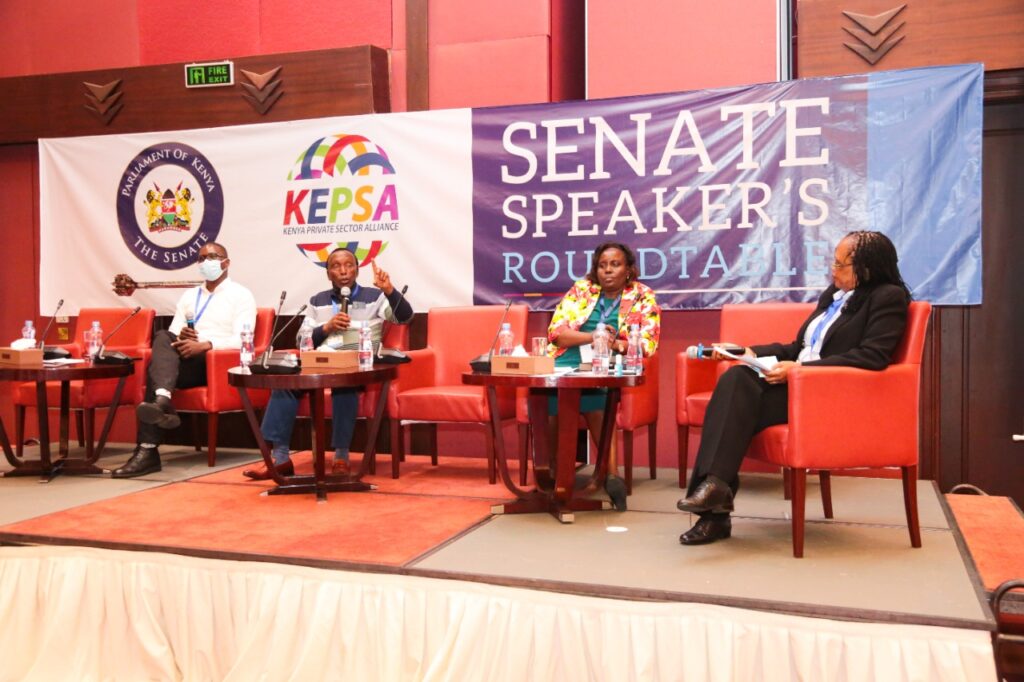
- KEPSA Hosts the 6th Speaker’s Round-table with the Senate on County Economic Competitiveness;
The Kenya Private Sector Alliance (KEPSA) and the Senate hosted the 6th Speaker’s Roundtable (SRT) at the PrideInn Paradise Convention Centre in Mombasa. The meeting brought together senators led by the Senate Speaker, the Rt. Hon. Sen. Amason J. Kingi, EGH, MP; private sector representatives and KEPSA Members and Management led by KEPSA CEO Ms. Carole Kariuki.
It set the legislative interventions agenda for FY 2024/25 to boost county economic competitiveness and drive Kenya’s business growth in a changing geopolitical landscape. It focused on integrating counties and facilitating smooth business operations to create wealth, jobs, and inclusive prosperity in Kenya.
Through the various Public-Private Dialogue (PPD) Platforms, KEPSA engages with all three arms of the Government of Kenya (Executive, Parliament, and Judiciary) to ensure a favourable environment for doing business.
The Speaker’s Roundtable with the Senate is a high-level dialogue platform between the business community and the Senate that facilitates a joint review of the country’s policy and legislative environment.
 It identifies crucial legislation for the Private Sector that needs to be reviewed or fast-tracked. The roundtable also addresses gaps requiring new legislative intervention based on the country’s and private sector development priorities.
It identifies crucial legislation for the Private Sector that needs to be reviewed or fast-tracked. The roundtable also addresses gaps requiring new legislative intervention based on the country’s and private sector development priorities.
“The Senate fully shares the view that a vibrant and flourishing private sector is essential for wealth and employment creation and sustainable development in our country,” said Rt. Hon.
Amason Jeffah Kingi, EGH, Speaker of the Senate, Republic of Kenya.Enhancing institutions and regulations is crucial to improving governance and reducing county business costs. Key areas include licensing, corruption, self-regulation, and public security.
A 2019 Kenya Institute for Public Policy Research and Analysis (KIPPRA) study found self-regulation (38%) and licensing (31%) were the biggest challenges for businesses in 42 counties, followed by public security (22%) and corruption (9%). For this reason, the 6th Speaker’s Roundtable with the Senate discussed these bottlenecks and other gaps that affect the business climate and cost of operation, inhibiting firms’ and industries’ productivity and potential for creating jobs and investments.

Further, enterprise support and finance gaps remain despite efforts to foster county-level economic growth. Inadequate local business support services, access to capital, export assistance, investment promotion, incentives, and business development services hinder business growth and sustainability.
Addressing these gaps is essential for improving the business environment, promoting economic development, and achieving long-term economic resilience.“Despite these challenges and a shifting geopolitical climate, I call on the private sector and the government to explore existing opportunities.
For instance, the implementation of the Bottom-up Economic Transformation Agenda (BETA) focusing on agricultural transformation and inclusive growth, skills development, support for SMEs to spur growth, development of county regional economic blocs, public-private partnerships to speed up development, and economic diplomacy to open and deepen external markets and attract investments into Kenya,” noted Ms. Carole Kariuki, KEPSA CEO.
Following this roundtable, the private sector proposed improving governance and reducing business costs through legislation such as the County Government Revenue Raising Process Bill and the Investment Promotion Facilitation Bill 2024. It also recommended incorporating human capital development into planning, with measures to improve skills, innovation, and vocational training at the county level. Recommendations were also made to enhance county infrastructure, including electricity, water, roads, and waste management, and improve efficiency at the Mombasa Port, all geared towards improving business growth opportunities.

When implemented, these recommendations will add to significant laws already enacted due to KEPSA’s engagement with the Senate over the years, including the Climate Change Act, Public
Procurement and Asset Disposal Act, National Electronic Single Window System Act, and Sustainable Waste Management Act. KEPSA has also contributed to other legislation, such as the National Hospital Insurance Fund Amendment Act and various healthcare bills.
A joint communique during the second day of the Roundtable, ending on June 13th, is expected to highlight the private sector’s commitment to actively leading economic transformation, unlocking investment and sustainable development in counties, and creating wealth and
employment. On the other hand, the Senate is committed to supporting the government’s economic recovery agenda and improving the investment environment by facilitating effective regulations, market access, enterprise support, and infrastructure development.







